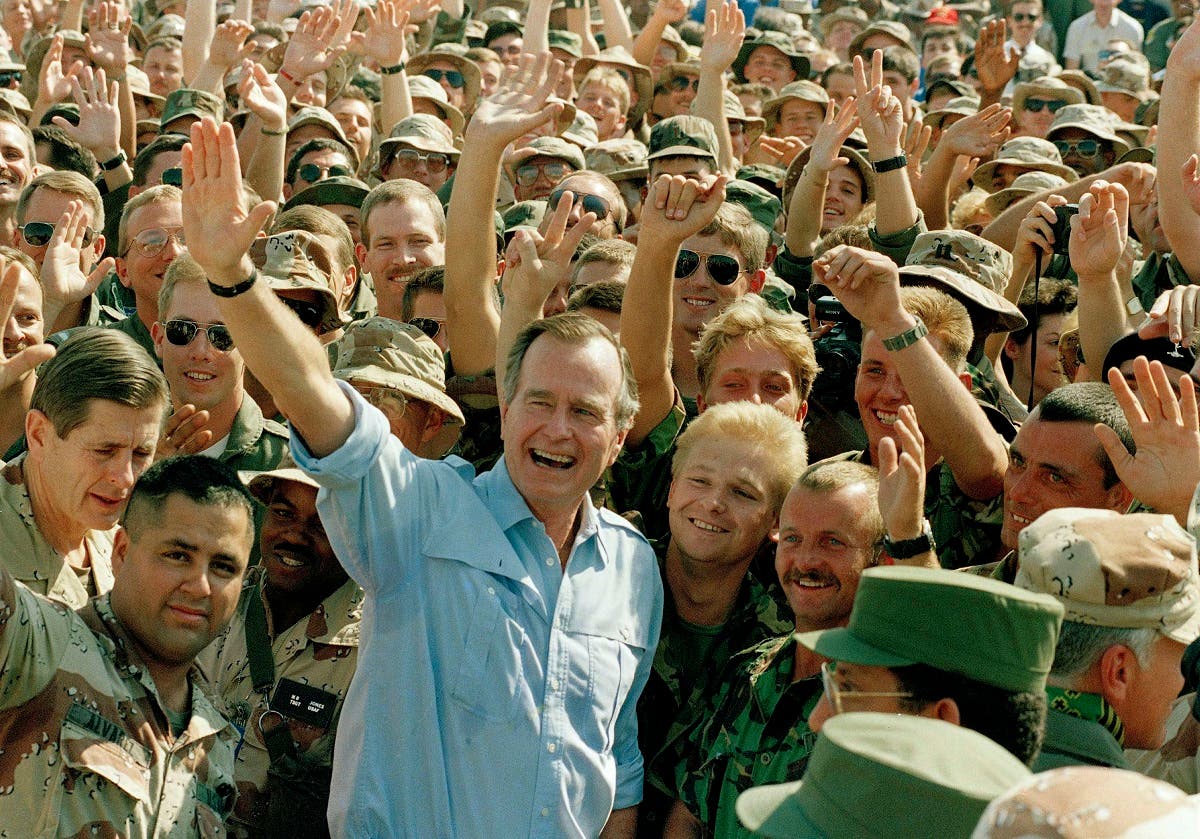The radio signal was fading in-and-out when I thought the AFRTC station announcer was asserting that president George H.W. Bush has lost his re-election bid to Bill Clinton. It was November of 1992 when I pulled to a side street off the Old Airport Road in Riyadh to find a spot for a clear radio signal. It was so, Bush lost. Inadvertently, I went back in memory reflecting on the events leading to that moment.
I remembered dismissing news of Saddam’s armies invading Kuwait as a joke when a friend broke the news to me. I remembered taping up the windows in my house in case shockwaves shatters them; standing in line to get gas masks. I remember the first siren in Riyadh and Sulaiman Al-Issa, the trusted newscaster, confirming the first incoming Iraqi missiles. Glued to the TV watching CNN’s continuous coverage of the war, I was reassured by the efforts of the American-led coalition.
The Gulf was in trouble. Saddam Hussein’s calculation was consistent with his understanding: the US would be agnostic on the matter. He was to overtake the small nation of Kuwait, and no one would be able to do anything about it. He didn’t factor King Fahad’s strategy of escalating the conflict to confront his army, one of the world’s top tear forces at the time. It was touch and go. US military leadership was not a foregone conclusion. At first, the US was not interested in engaging militarily in what it perceived to be a regional conflict. Besides, it would be a war of choice that requires political will and skillful finesse. Once Bush senior made his decision to take the US into war, Saddam’s days of expansionist adventures were to be over.
Effective and efficient
The American-led international force was effective and efficient in achieving its objective: drive Saddam’s army back, liberate Kuwait, and neutralize future threats. The internal argument within the administration was fierce. Strong voices demanded the US keep marching on to Baghdad to complete the job, as it were. Allowing Saddam to stay in power was perceived to be a mistake by many. Those same voices had a redo ten years later prompting the second Iraq war.
We can debate the pros and cons of those opposing views. Should the US have continued driving Saddam’s army further north to provide cover for Iraqis rising to topple Saddam? Would Arab leaders have felt betrayed by such unilateral actions and would have deemed the US an invading force of Arab lands? Would it have turned into an American war with perceived nefarious designs over oil reserves? Would it be reasonable to expect the war to continue to the present day? Perhaps. Fortunately for most and unfortunately for the oppressed Iraqis of the time, the man who had the ultimate say was a man of his word. Bush, the elder, completed the mission, packed his soldiers and left. The only remaining troops were those that were requested by Arab leaders within agreed upon objectives.
This made Bush the elder a legendary honorable figure albeit briefly. That chapter quickly turned into a mythical folktale as locals slowly forgot the details and collective senility blurred the names of the players. It didn’t help that Bush the father had a short-lived tenure as a one-term president. The forgotten story has consequential effects on the current wellbeing of most people in the Gulf States. He never took credit or boasted about his leadership and accomplishment — an honorable leader who is remembered fondly today by Americans of every political stripe.
George H. Bush’s death overnight at age 94 couldn’t have come in a more somber moment as US politics is taking a nosedive toward a day of reckoning. The contrast is glaring. The honor and grace by which this statesman led his nation is of a bygone era where true leaders fought over beliefs and came together over shared values; patriotism, truthfulness, and honer.
Humble, quiet dignity and kindness were traits evident to all who observer Bush, but yet, becoming the president of the free world was a product of political acumen and a healthy dose of competitiveness. His 40 years of public service were not the selfish kind seeking the spotlight for its own sake. In fact, his achievements included fighting in WWII where he was shot down into the Pacific ocean and had to be rescued by a submarine.
He headed the CIA taking on one of the most thankless and anxiety-ridden responsibilities in the nation. Political insiders praised his loyalty over eight years as Vice President to Ronald Reagan. His extraordinary success in leadership liberating Kuwait in 100 hours was like so many of his other accomplishments, forgotten. Today the US pauses to remind itself of the debt of gratitude it owes this man recalling the admirable acts of George H. Bush.
True, George H. had many impressive successes. But even when he didn’t, we can point to the honor by which he lost. Losing his reelection campaign was due in part to breaking his election promise to the American people when he famously said “Read. My. Lips. No new taxes!” As a result of the cost of liberating Kuwait and other compounding factors, he had to level with the nation in a televised address to renege on that promise. The American people made sure to punish him by voting for his challenger, Bill Clinton.
The legacy of George H. Bush will live on. Rest in peace for you have gone above and beyond the call of duty.


No comments:
Post a Comment